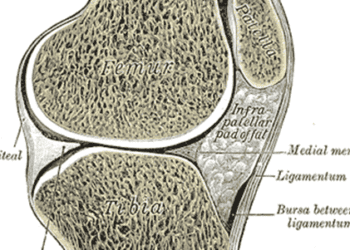Postmenopausal hormone replacement therapy use associated with increased ovarian cancer risk
1. In this meta-analysis of postmenopausal women with ovarian cancer, the risk of ovarian cancer was strongly associated with recent (<5 years) or current use of hormone replacement therapy but decreased with increasing time after cessation of therapy.
2. Applying the results to ovarian cancer incidence and death rates in England showed that hormone replacement therapy for 5 years after age 50 would result in about one extra case of ovarian cancer per 1,000 users and one extra death per 1,700 users.
3. Ovarian cancer risk varied between tumor types but was significantly increased for the two most common types, serous and endometrioid tumors.
Evidence Rating Level: 1 (Excellent)
Study Rundown: Guidelines for the use of hormone replacement therapy (HRT) during menopause in relation to the risk of ovarian cancer have varied over the years, with many studies publishing conflicting views. Some of these studies may not have been as reliable due to issues such as bias or study design. To reliably assess the effects of HRT on ovarian cancer risk, the Collaborative Group on Epidemiological Studies of Ovarian Cancer conducted a meta-analysis of 52 epidemiological studies involving 21,448 postmenopausal women with ovarian cancer.
The results showed that more than half of the women in the prospective studies who developed ovarian cancer had used HRT. Ovarian cancer risk was also found to be strongly associated with recent (<5 years) or current use of HRT, but risk decreased with longer time since stopping use. Risks varied between the four main types of ovarian tumors, with a significant increase in risk found for serous and endometrioid tumors. Finally, applying the results to ovarian cancer incidence and death rates in England showed that women who used HRT for 5 years after age 50 would have about one extra case of ovarian cancer per 1,000 users and one extra death per 1,700 users. Strengths of this study included the analysis of data from nearly all eligible epidemiological studies. Limitations of this study included that some retrospective studies may have been biased so the main conclusions were based off of prospective studies and that this study did not evaluate doses of hormones used in therapy.
Click to read the study in The Lancet
Relevant Reading: Risks and benefits of estrogen plus progestin in healthy postmenopausal women: principal results from the Women’s Health Initiative randomized controlled trial
In-Depth [meta-analysis]: 21,488 postmenopausal women with ovarian cancer from 52 studies (17 prospective and 35 retrospective) were included in the study, with 12,110 cases from prospective studies. The primary analysis involved prospective studies with information about duration and last use. Sensitivity analysis involved both prospective and retrospective studies. 55% (6,601) of the women in the prospective studies had used HRT for a median duration of 6 years, compared to 29% (2,702) of women in the retrospective studies for a median duration of 4 years.
Ovarian cancer risk was greater in women who had ever used HRT than those who never used HRT (RR 1.20, 95% CI 1.15-1.26; p<0.0001 for prospective studies, and RR 1.14, 95% CI 1.10-1.19, p<0.0001 for all studies). In prospective studies, the greatest risk was seen in those currently using HRT at the time of the study (RR 1.41, 95% CI 1.32-1.50; p<0.0001). Risk was also significant with less than 5 years (median duration 3 years) of HRT use (RR 1.43, 95% CI 1.31-1.56; p<0.0001). Additionally, in current or recent users, there was a significant increase in risk for two of the most common cancer types, serous (RR 1.53, 95% CI 1.40-1.66; p<0.0001) and endometrioid (1.42, 1.201.67; p<0.0001).
Image: PD
©2015 2 Minute Medicine, Inc. All rights reserved. No works may be reproduced without expressed written consent from 2 Minute Medicine, Inc. Inquire about licensing here. No article should be construed as medical advice and is not intended as such by the authors or by 2 Minute Medicine, Inc.







